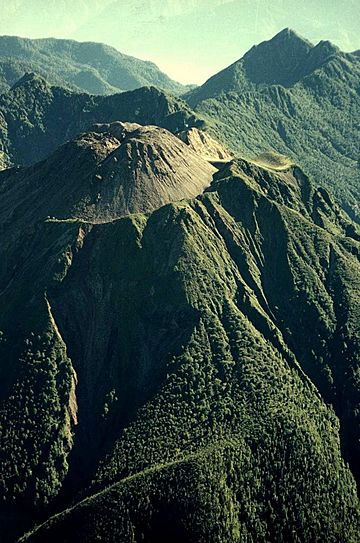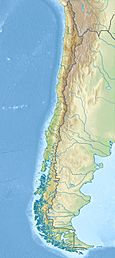Huequi facts for kids
Quick facts for kids Huequi |
|
|---|---|
 |
|
| Highest point | |
| Elevation | 1,318 m (4,324 ft) |
| Geography | |
| Location | Chile |
| Parent range | Andes |
| Geology | |
| Mountain type | Stratovolcano |
| Last eruption | 1920 (?) |
Huequi (pronounced weh-kee) is a stratovolcano located in the Los Lagos Region of Chile. It stands tall in the middle of the Ayacara Peninsula, very close to the Gulf of Ancud.
Huequi is about 1,318 meters (4,324 feet) high and has a sharp peak. People reported seeing it "smoke" in the 1950s, which means it might have had small eruptions or released gases.
What is Huequi Volcano?
Huequi is a type of volcano called a stratovolcano. This means it's a tall, cone-shaped mountain built up over time by many layers of hardened lava, ash, and rock.
How Huequi Formed
The volcano is made up of several parts. It has a group of lava domes, which are like thick, sticky piles of lava that have cooled down. These domes sit in a bowl-shaped area.
There's also a newer lava dome called Calle, which formed after the last ice age. An older volcano named Porcelana, from a time called the Pleistocene epoch, is also part of the area. It has smaller, newer cones that grew on its sides during the Holocene epoch.
Where is Huequi Located?
Huequi is found in southern Chile, a country in South America. It's part of the famous Andes mountain range, which stretches along the western side of the continent. Its location on the Ayacara Peninsula means it's surrounded by water on several sides, including the Gulf of Ancud.
See also
 In Spanish: Volcán Huequi para niños
In Spanish: Volcán Huequi para niños
- List of volcanoes in Chile
- Pumalín Park
- Chaitén
 | Calvin Brent |
 | Walter T. Bailey |
 | Martha Cassell Thompson |
 | Alberta Jeannette Cassell |


